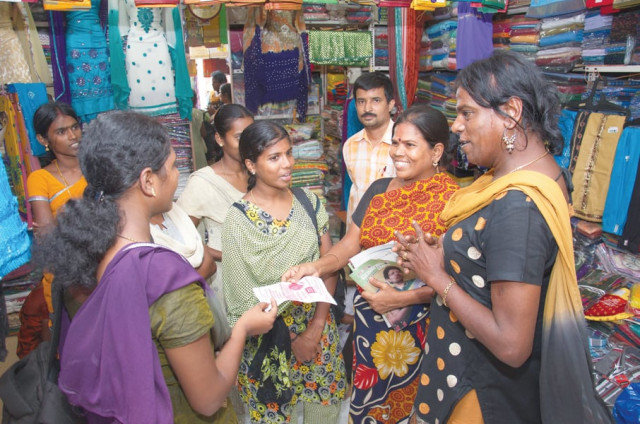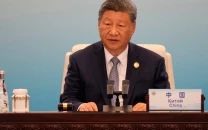Transgender runs for office after SC ruling
Bharati Kannamma thought to be India’s first transgender candidate in general election.

Bharathi Kannamma, a transgender hailing from the Madurai District in southern Tamil Nadu state talks to women in a shop while campaigning. AFP
Describing the Supreme Court judge’s ruling as a “milestone”, 53-year-old Bharathi Kannamma hopes to build on the momentum and overturn prejudices against India’s several million transgenders.
Running as an independent candidate in the city of Madurai in Tamil Nadu state, she is thought to be the first transgender accepted as a candidate in a general election.
“Even when people come to see me talk, they have certain set notions,” the social activist told AFP ahead of Madurai’s polling day on Thursday, in the phased general election that winds up in mid-May.
“It is only when they hear what I have to say and see me in person that they can get past the fact that I am a transgender,” she said.
In the Supreme Court ruling on Tuesday, the judge said a person can be legally recognised as gender-neutral, and transgenders should be included in government welfare schemes offered to other minority groups.
Often known as “hijras” in South Asia, transgenders are classified as people who have had sex change operations or who regard themselves as the opposite of their born gender.
They often live on the extreme fringes of India’s culturally conservative society, sometimes falling into prostitution and begging.
Meenakshi Ganguly, South Asia Director for Human Rights Watch, welcomed the court’s ruling but said the lack of previous political intervention “is a reflection of the neglect and bias that the community endures”.
Kannamma, however, is positive the judgment will help transgenders access education and employment opportunities, which in turn would help them contribute to their families’ earnings.
“When transgenders make an economic contribution to their families, families will also hesitate to shun them,” she said.
Kannamma herself only came out in 2004 as a transgender. Until then, she lived her life as a man and held the position of area sales manager at a bank in Madurai.
With a master’s degree in sociology, she chose to leave behind the corporate life and devote her time to sensitising society to transgenders, especially in schools and colleges.
She currently runs her own Bharathi Kannamma Trust with the aim of helping the transgender community and those who live below the poverty line.
Her current campaign team includes two transgenders, four men and a woman, working on a daily budget of 5,000 rupees ($83). She also has a personal advisory boa.
Published in The Express Tribune, April 21st, 2014.



















COMMENTS
Comments are moderated and generally will be posted if they are on-topic and not abusive.
For more information, please see our Comments FAQ